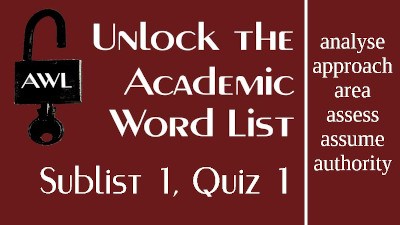AWL Sublist 1, Quiz #1 analyse, approach, area, assess, assume, authority
About the quiz

This is the first quiz in the Unlock the Academic Word List series. This quiz covers the first set of six words from sublist 1 of the Academic Word List, namely: analyse, approach, area, assess, assume, authority. If you haven't studied the words before, below is all the information you need, including part of speech, example sentences, and common collocations from the Academic Collocation List (ACL). Start studying them now!
Please log in to access quiz.
Learning Outcomes
By completing each quiz in the Unlock the Academic Wordlist series, sublist 1 (10 quizzes in total), you will:
- understand the meaning(s) of each sublist 1 word in academic use;
- learn to use vocabulary productively by focusing on word form, word family and example sentences for each word;
- use collocations from the Academic Collocations List (ACL) to develop knowledge of academic collocations for each word;
- learn patterns of affixes (prefixes and suffixes) for the words under study, e.g. to make noun or adjective forms.
analyse
[ænəlaɪz]
verb
1. make a mathematical, chemical, or grammatical analysis of; break down into components or essential features. E.g.: analyse a specimen, analyse a sentence, analyse a chemical compound [Syn: analyze, break down, dissect, take apart]
2. consider in detail and subject to an analysis in order to discover essential features or meaning. E.g.: analyse a sonnet by Shakespeare, analyse the evidence in a criminal trial, analyse your real motives [Syn: analyze, study, examine, canvass, canvas]
3. break down into components or essential features. E.g.: analyse today's financial market [Syn: analyze]
n (thing)
analyser, analysis
n (person)
analyst
verb
analyse, analyze
verb forms
analysed, analyses, analysing, analyzed, analyzes, analyzing
adj
analytic, analytical
adv
analytically
other
analyses (pl)
Collocations from the ACL
adj+n: careful analysis, comparative analysis, critical analysis, detailed analysis, economic analysis, final analysis, full analysis, further analysis, historical analysis, qualitative analysis, quantitative analysis, statistical analysis, subsequent analysis, systematic analysis, textual analysis, thematic analysis, theoretical analysis, analytical approach, analytical tool.
v+n: conduct (an) analysis, use (the) analysis.
approach
[əproʊtʃ]
verb
1. begin to deal with. E.g.: approach a task, approach a new project [Syn: set about, go about]
noun
1. ideas or actions intended to deal with a problem or situation. E.g.: his approach to every problem is to draw up a list of pros and cons [Syn: attack, plan of attack]
n (thing)
approach
verb
approach
verb forms
approached, approaches, approaching
adj
approachable, approaching
opposite
unapproachable
Collocations from the ACL
adj+n: alternative approach, analytical approach, common approach, comprehensive approach, critical approach, flexible approach, general approach, holistic approach, integrated approach, logical approach, methodological approach, qualitative approach, quantitative approach, similar approach, standard approach, systematic approach, theoretical approach, traditional approach.
v+n: adopt (an) approach, develop (an) approach, take (an) approach, use (an) approach.
area
[eriə]
noun
1. a particular geographical region of indefinite boundary (usually serving some special purpose or distinguished by its people or culture or geography). E.g.: it was a mountainous area [Syn: country]
2. a subject of study. E.g.: it was his area of specialization, areas of interest include...
3. the extent of a 2-dimensional surface enclosed within a boundary. E.g.: the area of a rectangle, it was about 500 square feet in area [Syn: expanse, surface area]
n (thing)
area
Collocations from the ACL
adj+n: complex area, core area, geographic(al) area, key area, local area, main area, major area, metropolitan area, particular area, related area, rural area, specific area, subject area, urban area, vast area, whole area, wide area.
v+n: cover (an) area, identify (an) area.
assess
[əses]
verb
1. place a value on; judge the worth of something. [Syn: measure, evaluate, valuate, appraise, value]
n (thing)
assessment
verb
assess
verb forms
assessed, assesses, assessing
adj
assessable
opposite
unassessed
other
reassess, reassessed, reassessing, reassessment
Collocations from the ACL
n+n: assessment process, risk assessment.
v+n: assess (the) impact (of), make (an) assessment.
assume
[əsum]
verb
1. take to be the case or to be true; accept without verification or proof. E.g.: I assume his train was late [Syn: presume, take for granted]
n (thing)
assumption
verb
assume
verb forms
assumed, assumes, assuming
Collocations from the ACL
adj+n: basic assumption, common assumption, fundamental assumption, underlying assumption, certain assumptions.
v+n: assume (the) role (of), assume responsibility, make (an) assumption.
authority
[əθɔrəti]
noun
1. an expert whose views are taken as definitive. E.g.: he is an authority on corporate law
2. official permission or approval. E.g.: authority for the program was renewed several times [Syn: authorization, authorisation, sanction]
3. the power or right to give orders or make decisions. E.g.: he has the authority to issue warrants [Syn: authorization, authorisation, dominance, say-so]
n (thing)
authorities, authority
adj
authoritative
Collocations from the ACL
adj+n: central authority, local authority, political authority, public authority.
Definitions taken from WordNet 3.0 Copyright 2006 by Princeton University. All rights reserved.
THIS SOFTWARE AND DATABASE IS PROVIDED 'AS IS' AND PRINCETON UNIVERSITY MAKES NO REPRESENTATIONS OR WARRANTIES, EXPRESS OR
IMPLIED. BY WAY OF EXAMPLE, BUT NOT LIMITATION, PRINCETON UNIVERSITY MAKES NO REPRESENTATIONS OR WARRANTIES OF MERCHANT-
ABILITY OR FITNESS FOR ANY PARTICULAR PURPOSE OR THAT THE USE OF THE LICENSED SOFTWARE, DATABASE OR DOCUMENTATION WILL NOT
INFRINGE ANY THIRD PARTY PATENTS, COPYRIGHTS, TRADEMARKS OR OTHER RIGHTS.
Pronunciation of words is adapted from The Carnegie Mellon University Pronouncing Dictionary.
